Undergraduate Research at Jefferson Lab
Monte Carlo Analysis of TMD Factorization in SIDIS
Student: Ross Dempsey
School: Johns Hopkins University
Mentored By: Wally Melnitchouk
High-energy lepton scattering off of hadrons can be understood by modeling the hadron as a collection of non-interacting partons. Deep inelastic scattering experiments permit the measurement of the parton distribution function (PDF), giving the longitudinal momentum of the partons. Semi-inclusive deep inelastic scattering (SIDIS) experiments extend this capability to transverse momentum dependent (TMD) PDFs, giving information about the three-dimensional structure of hadrons. In this study, we assess the validity of TMD factorization schemes and study non-perturbative effects in TMD-PDFs. We use the Pythia 8 Monte Carlo event generator combined with the Dipole Resummation (DIRE) parton shower plugin to study SIDIS cross sections in a wide region of the kinematic space. Using rapidity and transverse momentum values, we can observe the current fragmentation and target fragmentation regions, and also study non-perturbative behavior in the central rapidity region. In this paper, we show that a simple factorization scheme makes accurate predictions in the current fragmentation region, and that a non-perturbative structure emerges for TMD factorization in the central fragmentation region. These results lend support to future studies exploring TMD factorization and non-perturbative behavior in TMD evolution. Additionally, a neural network designed to predict the width of the central rapidity region throughout the kinematic space can be used for more efficient analysis in future work. The Monte Carlo analysis presented here will help to bridge the gap between the ongoing SIDIS experiments in Halls A, B, and C at Jefferson Lab and the three-dimensional spin-correlated structure of hadrons.

Citation and linking information
For questions about this page, please contact Education Web Administrator.
